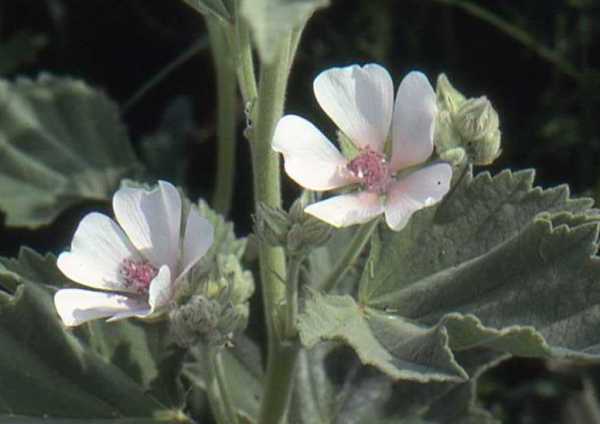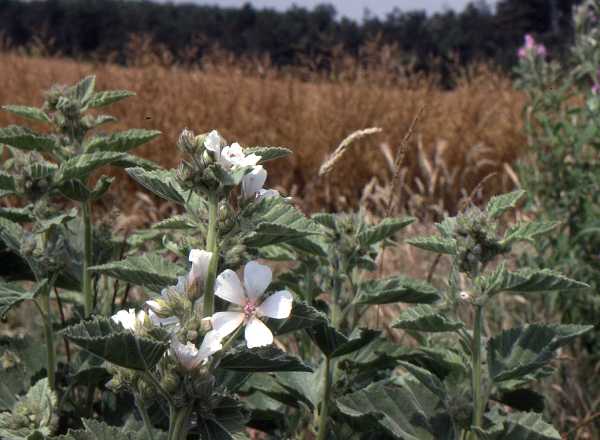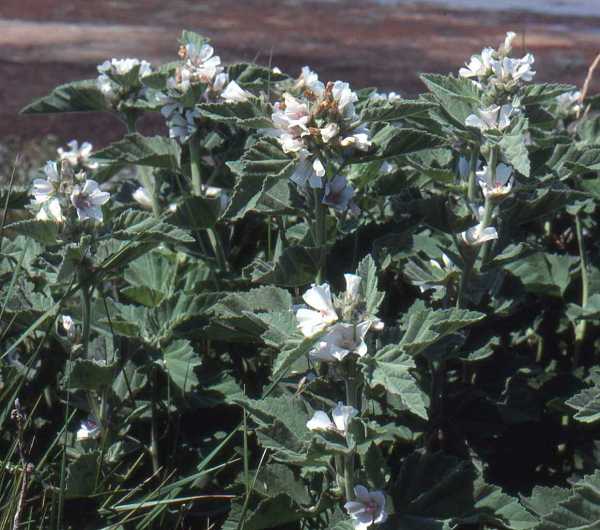Althaea officinalis - Marsh Mallow
Phylum: Magnoliophyta - Class: Equisetopsida - Order: Malvales - Family: Malvaceae

Favourite sweets: Marshmallows. Favourite wildflowers: Marsh Mallows. Coincidence? Certainly... in fact they are both obtained from one and the same plant, Althea officinalis.
Description
Marsh Mallow grows up to 1.5 metres in height and its lovely flowers are very pale pink and, at about 4cm diameter, slightly smaller than the flowers of Common Mallow Malva sylvestris. The triangular, downy grey leaves are soft and pleasant to the touch.

Distribution
In Britain, Ireland and other parts of Northern Europe Marsh Mallow blooms from August to September; it is most often found in the coastal areas of the south and west of England and Wales. This plant is also spread throughout much of the western Mediterranean region, and there it flowers from July onwards.
Habitat
The favoured habitats of Marsh Mallow are coastal wetlands and saltmarshes.
Blooming Times
In Britain, Ireland and and other parts of Northern Europe Marsh Mallow blooms in August and September.

Uses
The delightful pink and white marshmallow sweets are probably this wildflower's main claim to fame. The mucilage of the roots is the ingredient contributed by this grey and woolly-looking plant, and to this sugar, egg whites and vanilla are added. Throughout history various parts of this plant have also been used for a range of oyjer purposes including as an aphrodisiac; to make potions to cure aches, pains and hangovers; and as poultices to draw out bee stings and other insect stings. (We strongly advise against eating or using as medicines any plants without first obtaining qualified professional advice.)
Etymology
Althea, the genus name, may come from the Greek althos, meaning 'healing'. The specific epithet officinalis means official and indicates that this plant is (or was) considered to have pharmaceutical properties.
The fruits of the Marsh Mallow plant have also attracted attention. They are rounded, and as a result the plant has been called Billy Buttons, Cheeses, and even the Pancake Plant.
Acknowledgement
Pictures of Althaea officinalis on this page are shown by kind permission of Anne Horsfall.
Sue Parker's latest ebook is a revised and enlarged edition of Wild Orchids in The Burren. Full details here...
Buy it for just £5.95 on Amazon...
Please Help Us: If you have found this information interesting and useful, please consider helping to keep First Nature online by making a small donation towards the web hosting and internet costs.
Any donations over and above the essential running costs will help support the conservation work of Plantlife, the Rivers Trust and charitable botanic gardens - as do author royalties and publisher proceeds from books by Pat and Sue.

